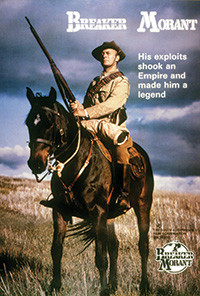
In the film Breaker Morant (1980), based on an actual historical event, three Australian soldiers are accused of murdering enemy prisoners during the Boer War. The film charts the circumstances of the incident and subsequent court-martial leading to the eventual verdict and subsequent fate of the three men.
Lord Kitchener, the commander-in-chief of British and colonial forces at the time, created the Bushveldt Carbineers as a special unit within the British Army in South Africa. The Carbineers were to use the commando tactics deployed by the Boer guerrillas. When Lieutenants Harry Morant, Peter Handcock and George Witton executed Boer prisoners and a German missionary, Lord Kitchener ordered their arrest and convened a court-martial in February 1902.
They were tried on three capital counts. Counts 1 and 2 charged all three with the murder of Boers taken as prisoners of war. One, named Visser, was captured in a raid wearing









